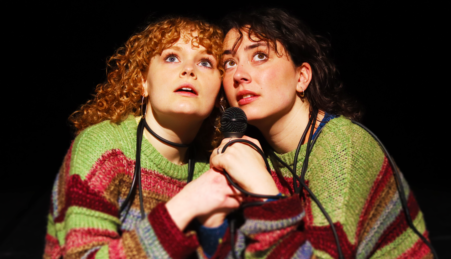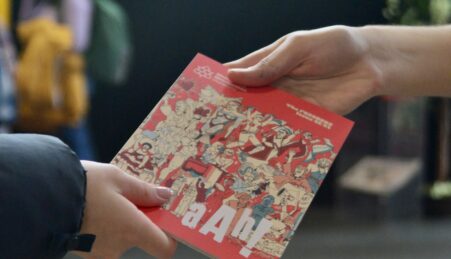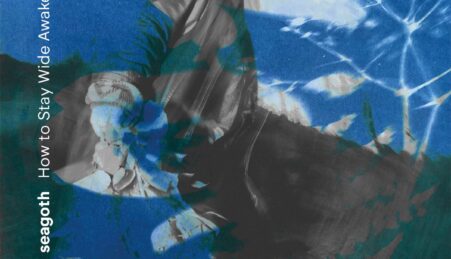By Grace Atkinson
Manchester Met Professor of Poetry Michael Symmons Roberts delivered a close reading of ‘Food for Risen Bodies’, a sequence from his 2004 poetry collection Corpus, at The International Anthony Burgess Foundation last week. The event formed part of ‘Encountering Corpses III’, a two-day conference that examines the notions of death and the corpse and was organised by the Manchester Met Research in Arts and Humanities programme (RAH!).
Michael Symmons Roberts has published seven poetry collections, two novels, and is an award-winning broadcaster and dramatist. He has won numerous prizes including the Forward Prize and the Costa Poetry Prize. Corpus won the 2004 Whitbread Prize and Mancunia, which was published in 2017, has been shortlisted for the T. S. Eliot Prize.
Poet and Project Manager of the Manchester Poetry Library Dr Martin Kratz, who wrote a PhD on the poetry of Symmons Roberts in 2016, hosted the event and introduced the theme of the corpse. He said, “I’ve personally been struck by the way in which the corpse in contemporary poetry is frequently written as an opportunity to demonstrate care towards the dead, […] but frequently also invites a level of care of the self.”
Kratz went on to introduce Symmons Roberts’ 2004 collection, saying, “Corpus is an inspiration of the body in life and afterlife […] these are poems that raise questions rather than answer them and I hope will prompt you to ask questions of your own.”
‘The pubs are open, you know,” Symmons Roberts teased the audience as he arrived on stage. He then went on to divulge some of the thinking behind ‘Food for Risen Bodies’, explaining, “The central pulse behind it was to try and imagine, with as much rigour as I could and with as much imaginative reach as I could, what it meant to take the idea of a resurrection body as seriously and physically as I could.”
He went on to read the six-part sequence, which tells, in sharp, sumptuous description, of the food of the resurrected: the first meal of the after-life, gum-like fruit preserved in a tomb, and various white creatures of the sea. ‘Food for Risen Bodies’ imagines the manoeuvres of entering the world anew, of being placed in a different world altogether. Placed outside of time, the poems are mythic, and circle notions of love, violence, and humanity’s imprint on the earth.
After the reading, Symmons Roberts joined Kratz to discuss the sequence and its making in more detail, recalling, “I wanted to try and write a poem that reached into that realm of what you might describe as spiritual, but was absolutely rooted in the body and the physical. […] The first thing that happens when someone is brought back from the dead is that you have to feed them, and the immediacy of that physical need, both the beauty and grace of the act of eating, but also the urgency of it, resonated with me powerfully at the time.”
‘Food for Risen Bodies’ is doused in the symbol of consumption; not just of food, but cigarettes too. Kratz asked Symmons Roberts about the symbolism of smoking. The poet replied,”There’s something about the way it relates to breath, breath […] the seat of the soul or the spirit, the self, and the idea that you have this thing that you draw into the very seat of that self and it comes out transfigured. So it renders breath as visible and also as beautiful.”
There was then a lengthy break, where wine and bread were put out for the audience. This was a sort of re-enactment of the Passover meal, and each of us became a live instillation of Symmons Roberts’ sequence.
After the break, the audience were invited to ask their questions to the poet. The first question asked about his own sense of the idea of resurrection. He said, “I don’t think I would claim to make sense of it, I think the process of writing poems about it is part of trying to think things through. […] The only method I have of approaching it is to try and explore it in poems, and to see if I can make it real, even fleetingly, in such a way that it can capture something for me.”
This answer opened up an interesting comment on the act of writing itself, where Symmons Roberts noted: “I believe fundamentally that poetry is an act of making, not an act of expressing, so I would never embark on a poem to put in another kind of language something that I had already felt I worked out.”
It seemed that it was because of poetry’s indeterminable nature as a form that Symmons Roberts chose it to look into the resurrection. As he explained, “Any philosophical idea worth its salt is problematic, and that’s where poetry comes in, I think. It’s a problematic territory, on the borders of what you can say or explore in other forms of language […] It allows you to go beyond those borders of linguistic construction.”
Symmons Roberts was then asked what relevance he thought the idea of resurrection had today. He paused for some time before he answered, then said, “The body is particularly complex now in that it’s become a battle ground, a place where we both invest huge amounts of hope […] and questions of ownership and authority over the body, but also don’t know quite what to do with it.”
Body-related politics has become a huge part of our social consciousness, and it was fascinating to think of Symmons Roberts’ ideas on the resurrection in relation to trends about body-ownership such as the #metoo campaign.
Symmons Roberts was asked the significance of the image of stitched lips, which occurs in section IV of the sequence. His reply further illuminated how ‘Food for Risen Bodies’ is relevant today: “At the time I was writing it, there were people in refugee camps who would do this, and were doing this to themselves as a protest that their voices weren’t being heard. It was a terrible and extremely powerful thing to do […] what happens to people that are so unheard that they die in that state?”
Finally, Symmons Roberts read more from the Corpus collection, including ‘Post-mortem’, ‘Corpse’ and ‘Jairus’. He then read ‘Excise Me’ from his 2013 collection Drysalter.
Michael Symmons Roberts’ latest collection Mancunia was published by Cape this year, and before he read ‘Manumission’ from it, he explained how the poem explored a city’s resurrection through freedom, and by doing so, the audience were shifted out of the after-life, and placed firmly back in Manchester.





Leave a reply